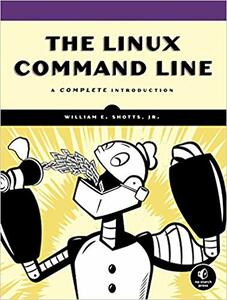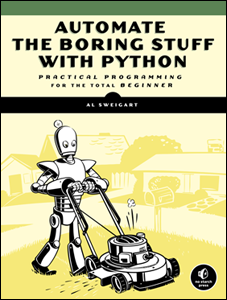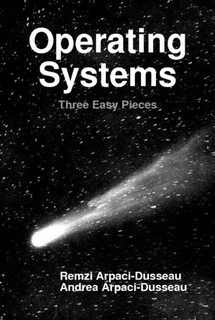This Is Not The Course Website You Are Looking For
This course website is from a previous semester. If you are currently in the class, please make sure you are viewing the latest course website instead of this old one.
Systems Programming
CSE 20289 is a core Computer Science and Engineering course at the University of Notre Dame that explores the fundamentals of computing systems. This course introduces students to the Unix programming environment where they will explore various command line utilities, files, processes, memory management, system calls, data structures, networking, and concurrency. Examining these topics will enable students to become familiar and comfortable with the lower level aspects of computing, while providing the foundation for further study in subsequent systems courses such as computer architecture and operating systems.

Upon successful completion of this course, students will be able to:
-
Utilize commands to navigate filesystems, manipulate files, manage processes, and explore system and network resources.
-
Compose shell scripts that combine common Unix commands with shell syntax to automate tasks.
-
Construct regular expressions and software pipelines to filter and process a variety of datasets.
-
Employ development tools to debug, profile, and test software applications.
-
Build and install software from source distributions or using package managers.
-
Compose Python scripts that employ data structures and libraries to process and manipulate data.
-
Construct C programs that use low-level functions or system calls to allocate memory, manipulate files and directories, and communicate over sockets.
-
Discuss the core tenets of the "Unix Philosophy" and how it is applied to modern software development.
Logistics
Class Information
- Lecture
- M/W/F 12:50 PM - 1:40 PM
- Location
- 102 DeBartolo Hall
- Zoom Meeting
- 941 3996 9057
- Mailing List (Class)
- sp24-cse-20289-01-group@nd.edu
- Mailing List (Staff)
- sp24-cse-20289-01-staff-list@nd.edu
- Slack
- #cse-20289-sp24
- GitHub
- nd-cse-20289-sp24
Instructor
- Instructor
- Peter Bui (pbui@nd.edu)
- Office Hours
- M/T/W/TH/F 2:00 PM - 3:30 PM, and by appointment
- Office Location
- 326D Cushing Hall
Help Protocol
- Think
- Slack
- Think
- Zoom
- Think
Teaching Assistants
- Teaching Assistant
- Daniel Blittschau (dblittsc@nd.edu)
- Teaching Assistant
- Matthew Carbonaro (mcarbona@nd.edu)
- Teaching Assistant
- Carolina Carpenetti (ccarpene@nd.edu)
- Teaching Assistant
- Josh Chun (jchun2@nd.edu)
- Teaching Assistant
- Steven Conaway (sconawa2@nd.edu)
- Teaching Assistant
- Danielle Croft (dcroft@nd.edu)
- Teaching Assistant
- Tommy Deiser (tdeiser@nd.edu)
- Teaching Assistant
- Ellie Jensen (ejensen7@nd.edu)
- Teaching Assistant
- James Lindell (jlindel2@nd.edu)
- Teaching Assistant
- Mayleen Liu (mliu5@nd.edu)
- Teaching Assistant
- Victoria Mendez (vmendez@nd.edu)
- Teaching Assistant
- Matt Spadafore (mspadafo@nd.edu)
- Teaching Assistant
- Coleen Joelle Valencia (cvalenc3@nd.edu)
- Teaching Assistant
- Jakub Wielgus (jwielgus@nd.edu)
- Teaching Assistant
- Kelly Williams (kwilli29@nd.edu)
Office Hours

Schedule
| Unit | Date | Topics | Assignments |
|---|---|---|---|
| Introduction | Wed 01/17 | Syllabus, Unix Shell Slides 00 Slides 01 Panopto | |
| Fri 01/19 | Git Slides 02 Panopto | Reading 00 | |
| Unit 01: Bourne Shell | |||
| Using the Shell | Mon 01/22 | Files Slides 03 Panopto | Reading 01 |
| Wed 01/24 | Processes, I/O Redirection Slides 04 Slides 05 Panopto | ||
| Fri 01/26 | Networking Slides 06 Panopto | ||
| Sat 01/27 | Command Line Adventure | Homework 01 | |
| Shell Scripting | Mon 01/29 | Variables, Command Substitution, Matching Slides 07 Panopto | Reading 02 |
| Wed 01/31 | Control Flow, Command Line Arguments Slides 07 Panopto | ||
| Fri 02/02 | Pipelines Slides 08 Panopto | ||
| Sat 02/03 | Meeting the Oracle | Homework 02 | |
| Text Filtering | Mon 02/05 | Regular Expressions Slides 08 Panopto | Reading 03 |
| Wed 02/07 | Filters Slides 08 Panopto | ||
| Fri 02/09 | Filters Slides 08 Panopto | ||
| Sat 02/10 | Weathering with Zipcodes | Homework 03 | |
| Exam 01 | Mon 02/12 | Slides R01 Checklist 01 Panopto | Reading 04 |
| Wed 02/14 | Exam 01 | ||
| Fri 02/16 | Python Scripting Slides 09 Panopto | ||
| Unit 02: Python | |||
| Python Scripting | Mon 02/19 | Functions, Tests, Arguments Slides 10 Panopto | Reading 05 |
| Wed 02/21 | Data Structures, I/O Slides 10 Panopto | ||
| Fri 02/23 | Regular Expressions, Processes, Requests Slides 11 Panopto | ||
| Sat 02/24 | Cut, WC | Homework 04 | |
| Data Processing | Mon 02/26 | CSV Slides 12 Panopto | Reading 06 |
| Wed 02/28 | JSON Slides 12 Panopto | ||
| Fri 03/01 | Functional Programming Slides 13 Panopto | ||
| Sat 03/02 | NameZ, SearX | Homework 05 | |
| Functional Programming | Mon 03/04 | Iterators, Generators Slides 14 Panopto | Reading 07 |
| Wed 03/06 | Parallel Computing Slides 15 Panopto | ||
| Fri 03/08 | Server-Side Programming Slides 16 Panopto | ||
| Sat 03/09 | Miles | Homework 06 | |
| Spring Break | |||
| Exam 02 | Mon 03/18 | Checklist 02 Slides R02 Panopto | Reading 08 |
| Wed 03/20 | Exam 02 | ||
| Fri 03/22 | Compiling and Building Slides 17 Panopto | ||
| Unit 03: C | |||
| Pointers, Arrays, Strings | Mon 03/25 | Libraries, Pointers Slides 18 Panopto | Reading 09 |
| Wed 03/27 | Arrays, Strings, Debugging (GDB, Valgrind) Slides 19 Panopto | ||
| Fri 03/29 | Easter | ||
| Memory Management | Mon 04/01 | Easter | |
| Wed 04/03 | Memory Allocation Slides 20 Panopto | Reading 10 | |
| Fri 04/05 | Structs, Unions, Bitsets, Linked Lists Slides 21 Slides 22 Panopto | ||
| Sat 04/06 | Trit | Homework 07 | |
| Filesystem, I/O | Mon 04/08 | Eclipse | |
| Wed 04/10 | Filesystem Slides 23 Panopto | Reading 11 | |
| Fri 04/12 | I/O Slides 23 Panopto | ||
| Sat 04/13 | Findit | Homework 08 | |
| Processes | Mon 04/15 | Processes Slides 24 Panopto | Reading 12 |
| Wed 04/17 | Signals Slides 24 Panopto | ||
| Fri 04/19 | Client/Server, URLs, Sockets Slides 25 Panopto | ||
| Sat 04/20 | Moveit, Timeit | Homework 09 | |
| Networking | Mon 04/22 | HTTP Client Slides 25 Panopto | Reading 13 |
| Wed 04/24 | HTTP Server Slides 25 Panopto | ||
| Fri 04/26 | VPS Slides 26 Panopto | ||
| Sat 04/27 | Nmapit, Curlit | Homework 10 | |
| Exam 03 | Mon 04/29 | Slides R03 Checklist 03 Panopto | |
| Thu 05/02 | Panopto | ||
| Mon 05/06 | Exam 03 | ||
Requirements
Coursework
| Component | Points |
|---|---|
| Readings Weekly reading assignments. | 10 × 4 |
| Homeworks Weekly homework assignments. | 3 × 10, 4 × 11, 3 × 12 |
| Exams Exams covering each unit. | 45, 45, 60 |
| Total | 300 |
Grading
| Grade | Points | Grade | Points | Grade | Points |
|---|---|---|---|---|---|
| A | 280-300 | A- | 270-279 | ||
| B+ | 260-269 | B | 250-259 | B- | 240-249 |
| C+ | 230-239 | C | 220-229 | C- | 210-219 |
| D | 195-209 | F | 0-194 |
Due Dates
All Readings and Homeworks are to be submitted to your own private GitHub repository. Unless specified otherwise:
- Readings are due by noon on the Monday of the assigned week.
- Homeworks are due by noon on the Saturday of the assigned week.
Policies
Participation
Students are expected to attend and contribute regularly in class. This means answering questions in class, participating in discussions, and helping other students.
Foreseeable absences should be discussed with the instructor ahead of time.
Community
Recalling one of the tenets of the Hacker Ethic:
Hackers should be judged by their hacking, not criteria such as degrees, age, race, sex, or position.
Students are expected to be respectful of their fellow classmates and the instructional staff.
Students with Disabilities
Any student who has a documented disability and is registered with Disability Services should speak with the professor as soon as possible regarding accommodations. Students who are not registered should contact the Office of Disabilities.
Academic Honesty
Any academic misconduct in this course is considered a serious offense, and the strongest possible academic penalties will be pursued for such behavior. Students may discuss high-level ideas with other students, but at the time of implementation (i.e. programming), each person must do his/her own work. Use of the Internet as a reference is allowed but directly copying code or other information is cheating. It is cheating to copy, to allow another person to copy, all or part of an exam or a assignment, or to fake program output. It is also a violation of the Undergraduate Academic Code of Honor to observe and then fail to report academic dishonesty. You are responsible for the security and integrity of your own work.
Late Work
In the case of a serious illness or other excused absence, as defined by university policies, coursework submissions will be accepted late by the same number of days as the excused absence.
Otherwise, there is an automatic penalty of 25% late penalty for assignments turned in 12 hours pass the specified deadline.
Note, there are opportunities for extensions as described below.
No assignments will be accepted after the last day of class without the permission of the instructor.
Classroom Recording
This course will be recorded using Zoom and Panopto. This system allows us to automatically record and distribute lectures to you in a secure environment. You can watch these recordings on your computer, tablet, or smartphone. In the course Canvas, look for the "Panopto" tool on the left hand side of the course.
Because we will be recording in the classroom, your questions and comments may be recorded. Recordings typically only capture the front of the classroom, but if you have any concerns about your voice or image being recorded please speak to me to discuss your concerns. Except for faculty and staff who require access, no content will be shared with individuals outside of your course without your permission.
These recordings are jointly copyrighted by the University of Notre Dame and your instructor. Posting them to other websites (including YouTube, Facebook, SnapChat, etc.) or elsewhere without express, written permission may result in disciplinary action and possible civil prosecution.
Self-Service Extensions
Each Homework assignment has an associated Guru Point, which is an extra credit opportunity. To avoid a late penalty, a student may choose to forgo or give up that week's Guru Point in exchange for two more days in which the student can work on the assignment for full credit.
For instance if an assignment is due on Saturday, then the student will have until Monday to submit their work.
To take advantage of this, a student simply makes a note on the Pull Request for the assignment and refrains from getting credit for the Guru Point.
Note, there are no free extensions for Readings. Instead, students should be aware that they can drop three Reading grades.
CSE Guide to the Honor Code
For the assignments in this class, you may discuss with other students and consult printed and online resources. You may quote from books and online sources as long as you cite them properly. However, you may not look at another student's solution, and you may not copy any significant portions of other's solutions. Furthermore, you may not utilize AI powered tools such as Co-Pilot, Tabnine, or ChatGPT for any of your programming assignments.
When preparing for tests in this class, you may not access exams from previous semesters, and you may not look at or copy other students' solutions.
The following table summarizes how you may work with other students and use print/online sources:
| Resources | Solutions | AI Tools | |
|---|---|---|---|
| Consulting | Allowed | Not Allowed | Not Allowed |
| Copying | Cite | Not Allowed | Not Allowed |
See the CSE Guide to the Honor Code for definitions of the above terms.
If an instructor sees behavior that is, in his judgment, academically dishonest, he is required to file either an Honor Code Violation Report or a formal report to the College of Engineering Honesty Committee.
Resources
Textbooks

The Linux Command Line
William Shotts Online Version

Automate the Boring Stuff with Python
Al Sweigart Online Version

Operating Systems: Three Easy Pieces
Remzi Arpaci-Dusseau, Andrea Arpaci-Dusseau Online Version